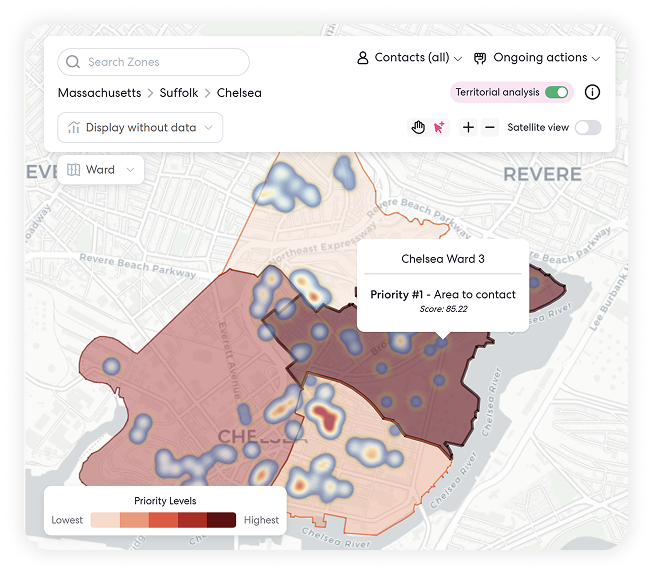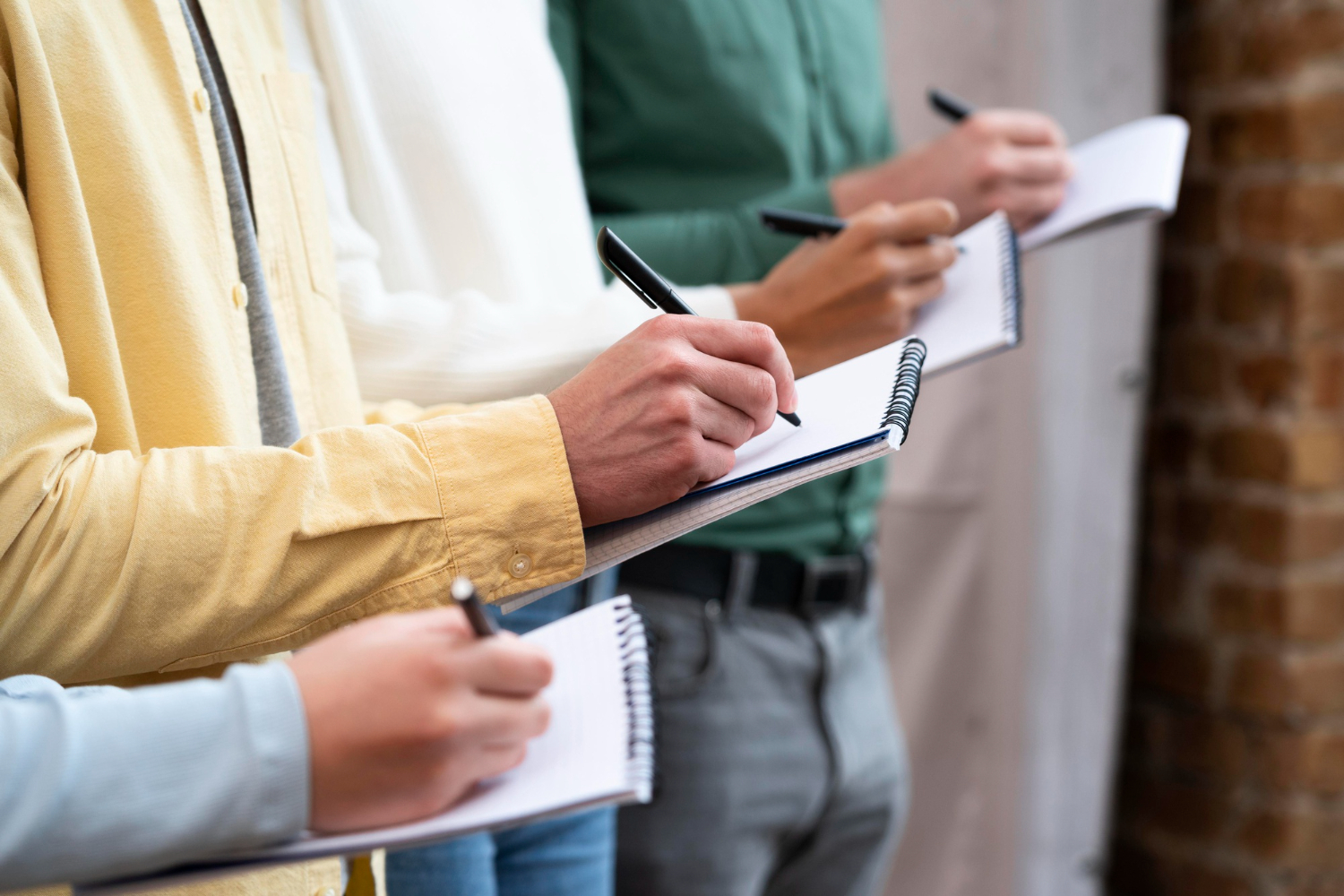What Is Canvassing and Why It Matters
Canvassing means
talking directly with people — in person or by phone — to raise awareness, gather opinions, or encourage participation.
Direct contact creates trust that digital messages cannot match.
Nonprofits, campaigns, and advocacy groups use canvassing to reach supporters where they are. Face-to-face conversations cut through media noise and build genuine relationships. Phone banking extends geographic reach while maintaining personal connection.
Why canvassing matters for civic participation:
Direct personal contact remains one of the most powerful tools for mobilization and engagement:
Used by Nonprofits, Campaigns, and Advocacy Groups
Organizations across sectors rely on personal contact to mobilize supporters. Field actions complement digital outreach by adding human accountability.
Builds Trust Through Conversation, Not Advertising
People trust neighbors and volunteers more than paid media. Personal conversations create credibility that broadcasts cannot achieve.
Proven to Raise Voter Turnout and Engagement
Randomized field experiments consistently show 6-7 percentage point turnout increases. Door-to-door contact drives democratic participation measurably.
Canvassing transforms passive sympathy into active participation. Volunteers become civic educators and community connectors. Every conversation captures data that improves future targeting. This compounding effect makes field organizing increasingly efficient over time.
Reason 1. To Increase Voter Turnout
Canvassing helps more people vote — and research proves it works.
Voter turnout determines election outcomes and policy priorities. Citizens who canvass directly combat low participation rates. Personal contact reminds people that their vote matters. Volunteers explain registration deadlines, polling locations, and ballot measures. This practical assistance removes barriers to participation.
How canvassing drives turnout:
1. Door-to-Door Outreach Increases Turnout by 6-7 Percentage Points
Personal accountability created by face-to-face promises drives follow-through.
2. Volunteers Explain When, Where, and How to Vote
Many people want to participate but lack logistical information. Canvassers provide polling hours, transportation options, and absentee ballot deadlines. This practical help converts intention into action.
3. Every Contact Encourages Democratic Participation
Beyond mechanics, conversations normalize voting as civic duty. Peer-to-peer encouragement creates social pressure that advertising cannot replicate.
See research summaries in Does Canvassing Work?
Reason 2. To Support a Candidate or Cause
Canvassing connects citizens directly with the causes or campaigns they believe in.
Belief without action feels hollow. Citizens canvass because passive support does not create change. Direct conversations amplify messages that matter to them personally. Every door knocked increases visibility for their preferred candidate or policy. This tangible contribution satisfies the desire to make a difference.
Why direct support through canvassing works:
1. Volunteers Share Verified Information About Candidates or Policies
Misinformation spreads easily online. Personal canvassing provides trustworthy sources and fact-based conversations. Volunteers correct misconceptions and answer specific questions.
2. Conversations Help People Understand Issues Beyond Social Media Noise
Complex policies reduce to soundbites on social platforms. Face-to-face dialogue allows nuanced discussion. Voters gain deeper understanding through extended conversation.
3. Each Interaction Builds Long-Term Awareness and Loyalty
Single conversations plant seeds for future engagement. Repeated contact over multiple cycles builds durable supporter relationships. Data from each interaction improves future campaign targeting.
Explore this impact in Why Is Canvassing Important for Movements?
Reason 3. To Connect with Their Community
Canvassing builds real human connection and strengthens local networks.
Modern life isolates people despite digital connectivity. Citizens canvass to rediscover neighbors and rebuild local bonds. Door-to-door conversations create relationships across demographic divides. Shared civic purpose bridges differences that social media amplifies. This reconnection satisfies deep human needs for belonging.
How canvassing strengthens community ties:
1. Door-to-Door Contact Creates Trust and Shared Purpose
Conversations on doorsteps feel more genuine than anonymous posts. Volunteers and voters recognize each other as real people with common concerns. This humanity breaks down partisan barriers.
2. People Rediscover Community Through Civic Conversation
Many volunteers report feeling disconnected before canvassing. Field work introduces them to neighbors they never met. Geographic proximity transforms into actual community.
3. Many Say It Is the Most Human Way to Take Action
Digital activism feels abstract and performative. Canvassing provides face-to-face validation and immediate feedback. Volunteers see reactions and adjust messaging in real time.
Read volunteer stories on Voters Not Politicians: Why We Canvass.
Reason 4. To Fulfill Civic Duty and Strengthen Democracy
Canvassing is how citizens go beyond voting to shape collective decisions.
Voting alone feels insufficient when democracy faces challenges. Citizens canvass because institutions require active participation to function. Direct contact educates communities about rights and responsibilities. This grassroots engagement makes government more accountable to regular people. Volunteers become democracy's front-line defenders.
How canvassing strengthens democratic participation:
1. Educates People About Rights, Voting, and Civic Engagement
Many citizens lack basic information about government processes. Canvassers explain how bills become laws, when elections happen, and how to contact representatives. This education creates informed participants.
2. Gives Individuals a Sense of Ownership in Democracy
Passive consumption of news breeds cynicism. Active canvassing creates agency and empowerment. Volunteers feel like protagonists rather than spectators in civic life.
3. Makes Institutions More Accountable to Citizens
Politicians notice when organized volunteers knock thousands of doors. Field presence demonstrates constituent priorities cannot be ignored. This bottom-up pressure influences policy decisions.
Read the ACLU Canvassing FAQ
See field implementation examples in How Does Canvassing Work in Field Campaigns?
Reason 5. What Citizens Gain Personally from Canvassing
Beyond civic impact, canvassing helps people grow personally and professionally.
Citizens discover unexpected benefits from volunteer canvassing. The skills developed transfer to careers and relationships. Personal growth complements civic contribution. Many volunteers report canvassing as transformative life experience. These individual gains create positive feedback loops that sustain long-term participation.
Personal development through canvassing:
1. Builds Communication, Empathy, and Confidence
Talking with strangers builds social courage. Listening to diverse perspectives develops emotional intelligence. Volunteers learn to articulate ideas clearly under pressure.
2. Strengthens Teamwork and Leadership Skills
Field organizing requires coordination and mutual support. Volunteers learn to motivate peers and solve problems collaboratively. Many develop leadership capabilities through campaign roles.
3. Boosts Emotional Intelligence Through Real Human Interaction
Reading body language and adjusting approach develops social awareness. Managing rejection builds resilience. Understanding different viewpoints increases cognitive flexibility.
4. Gives Purpose — Volunteers Feel Their Time Truly Matters
Modern work often feels disconnected from tangible outcomes. Canvassing provides visible impact and immediate feedback. Volunteers see how their effort translates into measurable change.
Research shows 82 percent of volunteers say canvassing improved their confidence. These personal gains keep people engaged beyond single campaigns. The skills learned benefit careers, relationships, and community leadership.
Grow your skills while creating change — plan your next field action with Qomon's Canvassing App.
Reason 6. The Psychology Behind Why People Canvass
People canvass because it satisfies deep human needs for connection, purpose, and impact.
Understanding volunteer motivation helps organizations recruit and retain field teams. Several psychological mechanisms drive canvassing participation. Citizens respond to efficacy, social proof, moral consistency, and emotional rewards. Successful campaigns activate these motivational levers systematically.
Psychological drivers of canvassing participation:
1. Efficacy: Seeing Real Change Boosts Motivation
People continue behaviors that produce visible results. When volunteers track doors knocked and supporters identified, effort feels worthwhile. Real-time data visualization increases perceived effectiveness.
2. Social Proof: People Act When Peers Act
Observing others canvass normalizes the behavior. Public recognition of volunteer contributions creates aspirational models. Team-based field organizing leverages group dynamics for sustained participation.
3. Moral Identity: Aligning Actions with Values Reinforces Commitment
Citizens canvass to demonstrate consistency between beliefs and behavior. Public activism signals identity to self and others. This identity expression becomes self-reinforcing over time.
4. Emotional Reward: Gratitude and Recognition Increase Satisfaction
Thank-you calls and appreciation events validate volunteer effort. Stories of impact create emotional connection to cause. Harvard Behavioral Insights research found public recognition increases volunteer retention by 37 percent.
Reason 7. To See Real Impact from Their Actions
Volunteers stay engaged when they can see results.
Abstract promises of change feel insufficient in data-driven era. Citizens want concrete evidence their effort matters. Modern canvassing platforms provide visibility that sustains motivation. Every door knocked, conversation logged, and follow-up completed appears in dashboards. This transparency converts volunteer labor into measurable progress.
How visibility drives sustained participation:
1. Field Data Shows Every Door Knocked and Action Taken
Volunteers see their individual contribution to team goals. Geographic heat maps reveal coverage patterns. Contact rates and completion metrics provide performance feedback.
2. Qomon Visualizes Progress in Real Time
Mobile apps sync instantly to central databases. Campaign managers track volunteer productivity live. Supporters receive automated updates showing collective impact.
3. Volunteers Feel Part of Measurable Success
When contacted neighborhoods show higher turnout, volunteers see cause-effect relationships. Data validation confirms their time investment produced real outcomes. This proof sustains engagement through future campaigns.
Track every action — from doors to impact — with Qomon's Door-to-Door App.
The most "Qomon" questions
Why do people volunteer to canvass?
To make visible change in their community. Citizens canvass because passive support feels insufficient. Direct conversations transform belief into action. Volunteers see measurable results from their effort.
What do they gain personally?
Confidence, empathy, and leadership experience. Canvassing builds communication skills and emotional intelligence. Many volunteers report personal transformation. The experience transfers to careers and relationships.
Does canvassing actually work?
Yes — turnout increases by 6-7 percentage points with systematic field contact. Decades of research confirm effectiveness. Personal accountability created by conversations drives follow-through. Results compound when campaigns maintain consistent presence.
Can anyone join canvassing efforts?
Yes, most campaigns train volunteers in minutes. No prior experience required. Organizations provide scripts, territory assignments, and support. Many volunteers start nervous but gain confidence quickly.
How can I start canvassing?
Join or launch a campaign with Qomon's Canvassing App. The platform centralizes contacts, routes field teams, and tracks progress. Organizations of all sizes use it to mobilize volunteers effectively.












.jpg)
.jpg)

.jpg)
